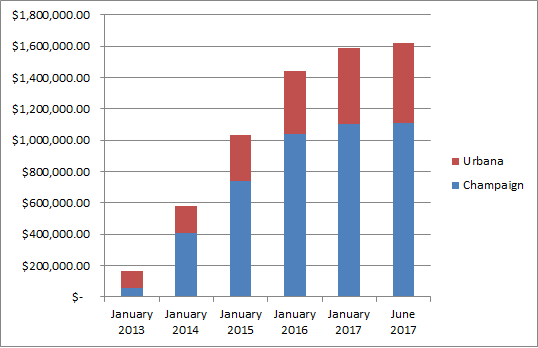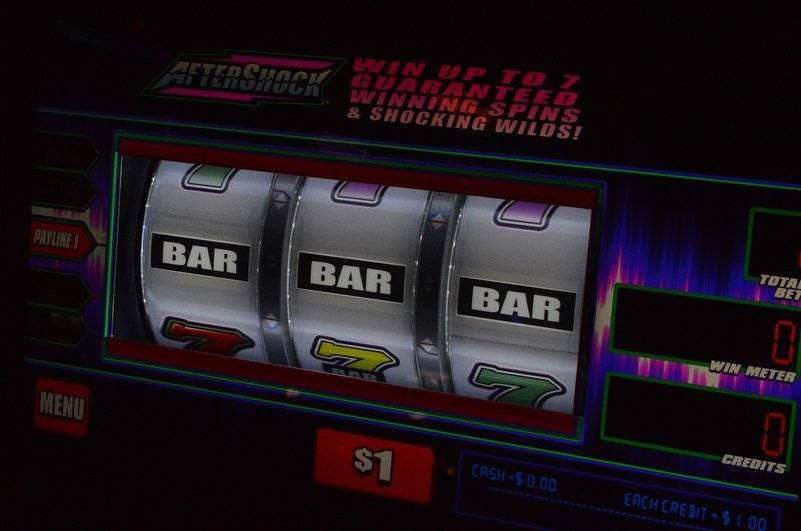In June 2017, Champaign-Urbana residents (and passersby) misplaced over $1.6 million. Well, misplaced may not be the right term. You see, there’s a hot, new craze that’s sweeping Champaign-Urbana. It’s a gimmick where you put in a dollar and get back 80 cents, and it’s played with bright colors and flashing lights to help you feel better about losing. It’s video gaming — and not the kind where you’re the plucky hero saving the world from certain calamity.
“Video gaming” is the innocuous operating term for “slot machines a block from your house.” After the state (and the city) gave the okay to video gaming in 2012, there was a brief period of toe testing the tepid water before the business owners went all in, and gaming has boomed over the last five years. In June 2014, 43 establishments in Champaign-Urbana offered video gaming. As of June 2017, that number had grown to 75, and that number would certainly have been higher had the cities not imposed new regulations (an outright moratorium in February, in Champaign’s case) to limit video gaming’s expansion. The following chart shows month-against-month comparisons of how much C-U residents are losing in video gaming machines. The figures in the graph are the dollars lost just in that particular month. Note how the February moratorium on video gaming has slowed its growth.

Graph derived from data referenced here.
Why has gaming grown so much? For one thing, it’s stupid easy to get licensed to provide gaming in your business: all you have to do is sell beer and a sandwich, and it doesn’t even have to be a particularly good sandwich. You’ve seen the gaming cafés popping up all over town, usually named after a woman who probably doesn’t work there. They have some small attempt at a menu and offer complimentary snacks, but the whole business is predicated on people coming in and transmuting their dollars into three quarters until they’ve run out of money or time.
The appeal to business owners is video gaming makes money hand over fist. In Illinois, for every dollar lost by a gamer to one of these machines, the state takes 25%, the city takes 5%, and the gaming establishment and the terminal operator (the company that actually owns all of the machines crowding your favorite bar or restaurant) split the remaining 70%. Why wouldn’t you put gaming machines in your business if you could? The state gets money, the city gets money, and you get money without having to work harder, hire more help, or even inconvenience yourself beyond getting the machines installed and maybe losing a few tabletops during your lunch and evening rushes. It seems like it’s great for everybody.
Except it’s not, we’ve realized. Besides the grotesque aesthetics of having slot machines on every corner of a community celebrated for its tremendous heart and diversity and iconic architecture, these machines bleed money out of C-U residents toward no lasting economic benefit. Money lost to video gaming is money that doesn’t enter the consumer economy. That is, people can’t buy stuff with it because they don’t have it. Curious about just how much money is getting shredded by gaming machines? You can see it establishment by establishment, month by month, at the Illinois Gaming Board’s website. Money that could be spent on things like housing, cars, food, and so on more or less evaporates, and this, long term, actually diminishes overall tax revenue, not to mention it doesn’t strengthen business in a way that leads to new enterprises, new jobs, or better wages. In an economy that thrives on people buying things, systems that reduce a person’s ability to buy said things usually aren’t too helpful.
However, some people really, really like video gaming. For some, it’s a way to unwind after a long day; for others, it’s just a way out of boredom. The businesses that have the video gaming machines really like video gaming, too: it’s a practically no-risk revenue stream. Outright gutting video gaming from our community would be a hard sell, so what’s to be done?
Toward the end of the summer, the Champaign City Council is going to decide what to do about video gaming going forward. City manager Dorothy Ann David proposed four possible pathways in a May 5th report to the council. Those pathways are:
- lift the moratorium and don’t regulate video gaming;
- change the way gaming licenses are obtained but don’t cap the number of business that can have those licenses;
- impose restrictions on gaming cafés and let legitimate bars and restaurants do as they will; or
- establish a hard ceiling on video gaming such that further growth in that industry is impossible.
The best option for our community is to clamp down hard on video gaming and stop its growth. We have to protect the purchasing power of our local citizens, and we have to curb the effect video gaming has had and will have on our city’s budget. As gaming grows, so does the city’s revenue, and the budget shifts to accommodate that growth. If we don’t resolve that now, we run the very real risk of a future in which Champaign needs video gaming to subsist, and then we’ll all have a sacred civic duty to burn money, drink warm beer, and eat iffy sandwiches. Nobody wants that.








